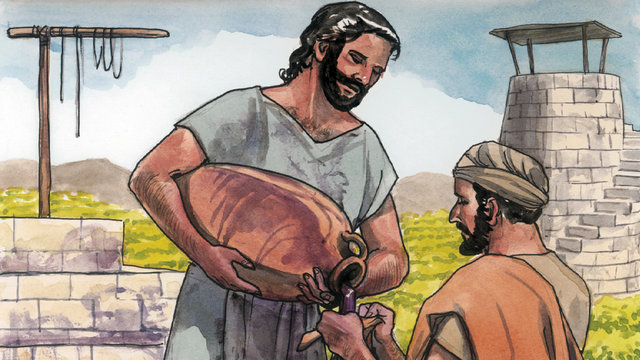The
Baptism and Filling of the Holy Spirit
Stephen
Terry
Commentary
for the February 4, 2017 Sabbath School Lesson
 “Neither do people pour new
wine into old wineskins. If they do, the skins will burst; the wine will run
out and the wineskins will be ruined. No, they pour new wine into new
wineskins, and both are preserved.” Matthew 9:17, NIV
“Neither do people pour new
wine into old wineskins. If they do, the skins will burst; the wine will run
out and the wineskins will be ruined. No, they pour new wine into new
wineskins, and both are preserved.” Matthew 9:17, NIV
When I was in my middle teen years and had just begun
attending the Seventh-day Adventist Church, I shared my new-found faith with a
close friend I had grown up with. He was drawn to my enthusiasm and as we
studied together, he decided he would like to join the church. He went home to
share his desire with his family. He reasoned that everything sounded so
wonderful, why wouldn’t he share it with his family. He believed that they
would want to join also. As it turned out, his mother was heavily into Spiritism
and wanted nothing to do with any churches. She forbade her son to have any
further contact with me and instead bought him a Ouija board. We drifted apart
due to our inability to see one another.
When I graduated high school, I left to join the Army, eventually when I returned
home on leave, I decided to try to contact my friend. I reasoned that since we
were both over 18, perhaps he would be allowed to make his own decision about
friendships, churches, and so forth. He was delighted to hear from me and
invited me to attend church with him. I discovered that he was now attending a
Pentecostal Church. The service began simply enough, but soon people were
babbling strangely. They told me that to receive the Holy Spirit people had to
act this way. The more the service went on, the more uncomfortable I became.
The spirit I felt there was nothing like the spirit I felt when attending the
Adventist Church. It felt dark and oppressive as they tried to pressure me to
join in their strange behavior. I beat a hasty retreat from that church, and
again lost contact with my friend. I wish I could say the story turned out well
in the end, but although I still consider him a friend, his lifestyle and mine
took completely divergent paths. As a result, I have long wondered if there was
more of Spiritism than Holy Spirit in that church. It did not seem to have a positive
influence on my friend’s life, and I am deeply saddened by that. But I did
decide to study the matter to determine if the Holy Spirit was something you
had to “pray through,” preferably by babbling, in order to receive? What I found
was that the Bible makes no secret about how to receive the Holy Spirit. On one
hand, it is really very simple, but on the other hand, it may be the hardest
thing some of us have ever done.
Receiving the Holy Spirit is a three step process. Peter, the Apostle, boldly
shared those three steps with thousands at Pentecost.[i] The followers of Jesus had
just received the Holy Spirit themselves and with that infilling, they were
able to proclaim the Kingdom of God with greater fervor and more understanding.
Thousands joined the body of Christ as a result.[ii] The first step that Peter identified was
repentance. The Greek word, translated “repentance” in our Bibles today is μετανοια
and it means literally turning and going in the opposite direction. This is because
when we are going our own way, we are walking away from God, seeking to place
our ideas and desires foremost in our lives. We might even say that we are
worshipping at the throne of Self. It is easy to recognize this in ourselves
and others because we tend to talk mostly about our desires and what we hope to
achieve. Our circle of friends may consist only of those whom we feel can help contribute
to fulfilling those desires. There is little interest in helping others unless
it somehow helps to achieve our dreams. If others take time away from focusing
on us and what we want, we find new sycophantic friends who will recognize the
superiority of our ambitions and stoke our egos, fellow worshippers around the
throne of Self. But God invites us to do an about face and travel toward Him
instead. He asks us to dethrone self and place Him on that throne. But why
would a self-centered ego choose to do that, especially since it can be
incredibly difficult to deny those desires?
It is very simple. We are drawn to the selfless love of
God, modeled in Jesus Christ. For three-and-a-half years, Jesus preached about
and modeled acts of selfless, loving service, and then He dramatically demonstrated
it by dying a guiltless death on a rough, wooden cross. He did not deserve to
die, and did not have to die, since He could command an army of irresistible force
that only God can muster.[iii] His love for us held Him
upon that cross, and that kind of love has the power to draw us.[iv] If you don’t know Him, even
now, you may be feeling a desire to know this Jesus who did so much for you.
His death set you free, you know. It is His blood that covers our past misdeeds
and allows us to walk toward Him confidently[v] as though we were as righteous
as He is. Self is really a terrible master. It binds us in chains of desires
that can never be fulfilled in any lasting manner. They can be like cotton
candy, big and desirable when you look at it on the paper cone, but when you
bite into it, it shrinks down to almost nothing. On the other hand, when we
walk toward Jesus, we find ourselves not only serving others instead of
focusing on our needs, but in doing so we find our needs met as well.[vi]
When we change direction and begin moving toward God, we are invited to be
baptized, publicly immersed in water and then raised out of it. This can be
seen as symbolically representing our death to our old way of life and our
rebirth into a new life. This to a degree parallels Jesus’ death, burial and
resurrection. But it also has another profound meaning we will discuss in a
moment. Once we have given our selfish hearts to God and begin walking toward
God covered in the righteousness that only Jesus’ blood can place upon us, once
we have been baptized in the water, then we receive the gift of the Holy
Spirit. It is not something we have to struggle to receive. Peter, after they received
the Holy Spirit on Pentecost was inspired to reveal it is received
automatically. He did not say, “You might receive the Holy Spirit.” He did not
say “You have to try to receive the Holy Spirit.” He said “You will receive the
Holy Spirit.” There was no hint of doubt in Peter’s words. So why then did
Peter and the others, though baptized, not receive the Holy Spirit until
Pentecost? This may be because they had only been baptized by John. They had
not been baptized in Jesus. This is because Jesus baptized no one, not even
John the Baptist,[vii]
not even His disciples.[viii] Interestingly, Jesus
immediately received the Holy Spirit upon baptism, even though baptized by
John. This is likely because he did not need the imputed righteousness the rest
of us need through Jesus, because He was already righteous. Further
confirmation of the difference between the baptism of John and the Holy Spirit
not being conferred until the believers were baptized in the name of Jesus we
can also look to Paul’s experience when he came upon twelve men who only had
John’s baptism when he traveled to Ephesus. Upon baptism in Jesus, they
received the Holy Ghost.[ix]
Some might have you believe that the Holy Spirit is some
secret power that can only be parceled out by powerful clergy, who alone have
the right to baptize. Nothing could be farther from the truth. One follower of
Jesus baptizing another into fellowship with the Savior is all that is required.
But why is that? Doesn’t the Bible require special ordination services to give
certain, more spiritual people, especially men, the power to do things like
baptism? The institutional church we have today with its hierarchical power
structure may see itself, in a very Catholic way, as the source of grace
imparted only by ordained clergy, specifically clergy they have ordained. They
question the authority of anyone to depart from that model, much as the church
officials of Jesus’ day questioned His authority.[x] This is where the more
profound meaning of Peter’s three-step process becomes important. You see, it
is not just a celebration of grace. It is a ceremony of ordination. God never
intended for ordination to be the creating of a class of career clerics who
controlled who was allowed to minister and when. Instead, through Jesus, He
opened up the ministry to every believer, and ordained each one to the priesthood.
He then imparts the Holy Spirit to each to empower that ministry. The same
Peter who said all about these three steps at Pentecost, also further
reaffirmed this idea of universal priesthood. He may not have fully understood
it, but under inspiration, he proclaimed to those who had come to Christ, “You
are a chosen people, a royal priesthood.”[xi] Through the blood, the
water and the Spirit, we each are fully empowered to build the body of Christ
and to engage in service to others.
Those who like to claim authority over others in the name of the institutional
church like to claim the authority of the Aaronic Priesthood. They do not
understand that was a finite priesthood done away with at the cross. It has now
been replaced by a higher, eternal order,[xii] and God will grant His
people eternal life that they may fulfill the demands of such an order. Christ
is our high priest in that order, and He grants us all authority to teach and
to baptize all nations, everywhere.[xiii] Let us be about our
ministry.
